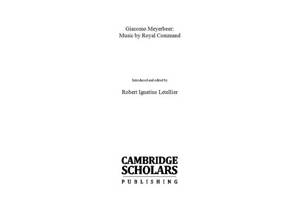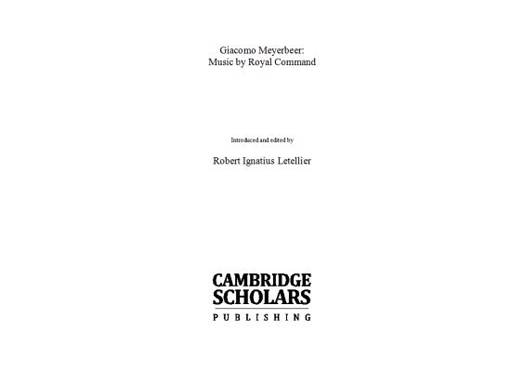
- Retrait gratuit dans votre magasin Club
- 7.000.000 titres dans notre catalogue
- Payer en toute sécurité
- Toujours un magasin près de chez vous
- Retrait gratuit dans votre magasin Club
- 7.000.0000 titres dans notre catalogue
- Payer en toute sécurité
- Toujours un magasin près de chez vous
99,95 €
+ 199 points
Description
The manuscripts scores contained in this collection further extend knowledge about Meyerbeer's non-operatic compositions-instrumental, choral and occasional. These totally unknown works by a great operatic master range from a substantial cantata in the style of a dramatic monologue (for tenor solo with chorus and brass orchestra), through a brassy celebratory processional march, to a brief unaccompanied chorus of welcome. All the pieces are linked by their association with the various German Royal families with whom the composer had some association. All the were written, as it were, 'by Royal Command', for regal occasions-either based on texts by a king for that monarch (King Ludwig I of Bavaria), for a Court festivity ordered by the ruler (King Friedrich Wilhelm IV of Prussia), or to celebrate the formal visit of a royal head of state to the nation (Queen Victoria and Prince Albert to Prussia). A synthesis of old and new, with implications of the dramatic monologue, is characteristic of Der Bayerischer Schutzen-Marsch, a cantata for four soloists and brass instruments to a text by King Ludwig I of Bavaria (January 1814) commemorating the struggle against Napoleon, which Meyerbeer set for the king. It was performed in the presence of the monarch on 18 March 1831, just eight months before the spectacular success of Robert le Diable, and forms a type of prelude to the composer's French period. In spite of the choral and military nature of this work, the essentially lyrical and confessional mode of the words make up a psychological drama born of a frustrated yearning for action in a struggle against tyranny for the restoration of freedom and peace. On the 28 February 1843 at the Berliner Schloss, immediately after taking up his new position as Generalmusikdirektor, Meyerbeer prepared an occasional piece, a masque for a ball at Court for some three thousand guests. Called Die Hoffest zu Ferrara, the text was by the poet Ernst Raupach, The masque was a paraphrase of elements taken from Torquato Tasso's Gerusalemme liberata (1581), a Renaissance epic celebrating the First Crusade. Members of the Royal family appeared in costume as guests from the House of D'Este of Ferrara, forming part of a series of tableaux vivants presenting scenes from famous epic: Meyerbeer composed music for all the scenes, some for soloists, some for chorus. Most is known from contemporary newspaper reports, because the score is lost. Herminia's Romance was the only piece to be published; the processional march has survived in manuscript. The masque is interesting for focussing on a particular and recurrent features of Meyerbeer's style-the pastoral topos, exemplified in the Chorus of Shepherds, and the military mode in the Festmarsch for the entry of the guests. This military overtone is so often identifiable, characterized by strutting dotted rhythms and relentless propulsion. On 25 August 1842 he completed the first of his four Fackeltanze, the ceremonial polonaises written for the special torch-lit rituals attendant on the public betrothal of a member of the Prussian Royal family. On 9 August 1845 Meyerbeer travelled to Cologne to direct the Court concert held by King Friedrich Wilhelm IV of Prussia for the reception of Queen Victoria and Prince Albert who were paying a state visit to Prussia. One of the duties incumbent upon Meyerbeer as general director of the royal music, was the provision of pieces required for state occasions involving the king. Just such a piece was the brief choral work written to welcome the Queen of England to Prussian territory. The short four-part choral work with allusion the British anthem, has never been published, and deserves to be better known.
Spécifications
Parties prenantes
- Auteur(s) :
- Editeur:
Contenu
- Nombre de pages :
- 130
- Langue:
- Anglais
Caractéristiques
- EAN:
- 9781443826686
- Date de parution :
- 01-02-11
- Format:
- Livre relié
- Format numérique:
- Genaaid
- Poids :
- 276 g

Les avis
Nous publions uniquement les avis qui respectent les conditions requises. Consultez nos conditions pour les avis.






